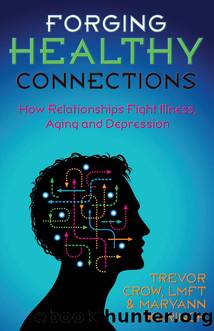Forging Healthy Connections by Trevor Crow

Author:Trevor Crow [Crow, LMFT, Trevor; Karinch, Maryann]
Language: eng
Format: epub
ISBN: 9780882824536
Publisher: New Horizon Press
DETERMINING YOUR ADULT ATTACHMENT STYLE
We have created an informal questionnaire to help you ascertain some things about your attachment style. Itâs not a test instrument like the Attachment Interview Protocol that a researcher might use. This is just a simple set of questions to help you determine what informs how you behave and react to your partner as well as others in your life. Keep in mind that behaviors are reciprocal, so this set of questions may lead you to an understanding of why your partner and others respond to you in a particular way, too.
Couples Attachment Questionnaire
When your partner is annoyed, frustrated or even angry with you, you:
a)Donât react to the anger, but ask what is going on with your partner and offer to help by empathizing with his/her situation.
b)Become afraid to make matters worse, thinking that whatever you say will only make your partner angrier; you pull back. Perhaps you donât know what to do, so you shut down.
c)Become angry and fight back.
When you feel as if your partner is distant and not interested in your feelings or what you need, you:
a)Ask your partner for attention and understanding, saying you feel lonely and disconnected from him or her.
b)Clam up and say less, hoping your partner will pull it out of you, because he or she really should know you well enough to read your mind.
c)Yell loudly and criticize your partner to get attention.
When you disagree, who yells the loudest or says the most?
a)Youâre a listener, not a yeller.
b)If your partner starts yelling, you leave the roomâor maybe the house.
c)You do.
Who is the first to âmake niceâ or attempt a repair after you have a fight?
a)You are.
b)Your partner is.
c)Both are: sometimes you, sometimes your partner.
When you observe your partner talking to another person at a party who is attractive, you:
a)Wait until your partnerâs conversation is over and later tell your partner that it was hard for you to watch him or her talking to an attractive person. It made you feel worried and vulnerable. Then you ask for reassurance and reconnection from your partner.
b)Walk away and ask for a glass of wine, vowing never to talk about it but secretly hoping your partner sees how hurt you are.
c)Get angry, interrupt the conversation and criticize your partner there or later, blaming your partner for being insensitive or rude.
When your partner is feeling an intense emotion (fear, joy, grief) you:
a)Reach out, empathizing with your partner, allowing your partner to feel the intensity of the emotion while staying with him or her in the experience, hoping to provide comfort and support.
b)Try to help him or her by saying âthis is not a big deal,â âit will go awayâ or âdonât pay attention to it.â
c)Try to step in and solve the problem in order to alleviate the emotion.
When something goes wrong, you:
a)Aim for shared understanding of what happened.
b)Either take the blame or go straight to blame-sharing to avoid confrontation.
c)Blame the other person.
If you chose the first answer to most of the questions you are most likely a securely attached person.
Download
This site does not store any files on its server. We only index and link to content provided by other sites. Please contact the content providers to delete copyright contents if any and email us, we'll remove relevant links or contents immediately.
The Compound Effect by Darren Hardy(8968)
Wonder by R.J. Palacio(8580)
Atomic Habits: Tiny Changes, Remarkable Results by James Clear(8344)
Becoming Supernatural by Dr. Joe Dispenza(8217)
Wonder by R. J. Palacio(8110)
Change Your Questions, Change Your Life by Marilee Adams(7783)
The Road Less Traveled by M. Scott Peck(7603)
Born to Run: by Christopher McDougall(7127)
Daring Greatly by Brene Brown(6514)
Big Magic: Creative Living Beyond Fear by Elizabeth Gilbert(5772)
Grit by Angela Duckworth(5615)
The Slight Edge by Jeff Olson(5417)
Men In Love by Nancy Friday(5240)
The Wisdom of Sundays by Oprah Winfrey(5161)
You Are a Badass at Making Money by Jen Sincero(4930)
Fear by Osho(4740)
The Miracle Morning by Hal Elrod(4727)
The Four Tendencies by Gretchen Rubin(4603)
Rising Strong by Brene Brown(4459)
